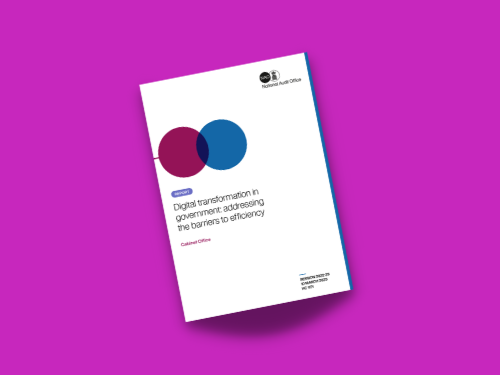Government’s digital deficit revealed: new report calls for urgent transformation
 A newly published State of Digital Government Review lays bare significant challenges in the UK public sector’s use of technology and data.
A newly published State of Digital Government Review lays bare significant challenges in the UK public sector’s use of technology and data.
The report, commissioned by the Department for Science, Innovation and Technology, reveals a public sector grappling with outdated technology, fragmented services, and cybersecurity risks, leaving citizens and public servants frustrated.
Despite spending £26 billion annually on digital initiatives, almost half of public services remain undigitised, and satisfaction with these services has dropped over the past decade.
The findings expose deep systemic challenges, including a reliance on legacy systems that make up almost a third of the government’s IT estate, with many of these rated as “high risk” or “red-rated.” Critical outages in 2024 disrupted essential services, including 123 incidents in NHS England, and cybersecurity vulnerabilities remain alarmingly high.
The report also highlights a troubling leadership gap, with digital leaders largely absent from senior decision-making roles. Combined with recruitment challenges - where 50% of digital and data roles remain unfilled- this has left the government struggling to attract and retain the talent necessary to drive transformation.
However, the review also outlines a clear opportunity: full digitisation of public services could deliver £45 billion in annual savings, equivalent to 4-7% of public spending. To realise this potential, the report calls for bold action, systemic reform, and a shift in priorities to build a modern, resilient digital government capable of meeting the challenges of the digital age
Key findings
The review reveals a public sector struggling to meet modern digital expectations:
- Only 47% of central government services and 45% of NHS services offer digital pathways, leaving users reliant on manual processes like phone calls, letters, and paper forms.
- Public satisfaction with digital public services has fallen from 79% to 68% in the past decade.
- Legacy technology accounts for 28% of IT estates, increasing risk and cost, and 22% of systems are classified as "red-rated," indicating high potential for failure.
Cybersecurity risks are also alarmingly high, with 123 critical outages reported in NHS England alone in 2024. Despite some progress in cloud adoption, many public organisations still rely on fragmented and outdated systems, making them vulnerable to cyberattacks.
The report underscores persistent workforce issues:
- Digital leaders are underrepresented in executive roles across government. Only four central departments have a Chief Digital or Technology Officer on their executive committee.
- Recruitment challenges persist, with 50% of digital and data roles unfilled in 2024, largely due to uncompetitive salaries compared to the private sector.
A £45 billion opportunity? 👀
Despite these issues, the review identifies significant potential savings through digitisation:
- £45 billion annually could be saved, representing 4-7% of public sector spending.
- Savings would primarily come from automating manual processes, adopting low-cost digital channels, and reducing fraud.
The report identifies five root causes:
- Leadership: Lack of incentives for prioritising digital transformation.
- Structure: Fragmentation of public sector organisations limits interoperability.
- Measurement: Inconsistent metrics for digital performance.
- Talent: Under-resourced teams and uncompetitive pay.
- Funding: Budgeting models favour new programmes over maintaining legacy systems.
The report states: “We must take a realistic and unflinching view of how much more we have to do to create a modern digital government and reform public services.” It emphasises the need for coordinated leadership and sustained investment to modernise systems and improve public satisfaction.
This comprehensive review provides a roadmap for reform, that is now being acted on with the Government's parallel announcement a new digital centre of excellence in Whitehall.






